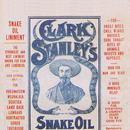P-Hacking, Quackery, Growing Greater Grains. Mar 2, 2018, Part 2
If you like to read about the psychology around food and eating, you’ve probably come across stories based on research from Cornell’s Food and Brand Lab, directed by Brian Wansink. In an article published this week by Buzzfeed News, science reporter Stephanie Lee reports on a history of shoddy research practices in the lab, and a chain of emails that indicates a practice of “p-hacking”—a statistical wrangling of data aimed at making a borderline result appear to be statistically significant. Lee discusses her reporting with Ira, and talks about the challenge of reproducibility in scientific research.
Having trouble warding off that weight gain? Have you tried taking some tapeworm eggs? Got a troublesome toothache? Consider cocaine. Swollen joints? Slather on some snake oil. In the new book Quackery:A Brief History of the Worst Ways to Cure Everything, authors Lydia Kang and Nate Pederson survey a medicine chest’s worth of quacks through the ages, and employ modern-day scientific evidence to evaluate their efficacy.
The grain sorghum might not seem familiar to many in the U.S.—but it’s the fifth most important cereal grown in the world. It’s a common human food ingredient in Africa and parts of Asia, and is often used in the U.S. for animal feed or for ethanol production. Now, researchers report that they’ve identified the pathway in one mutant strain of the grain that allows that variety to produce three times as many seeds per plant as regular sorghum.
Every day, reporters and producers at The World are hard at work bringing you human-centered news from across the globe. But we can’t do it without you. We need your support to ensure we can continue this work for another year.
Make a gift today, and you’ll help us unlock a matching gift of $67,000!
